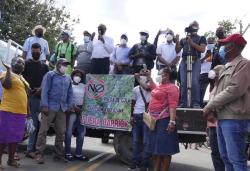Open letters from 88 organizations and 15 jewelry producers highlight the human rights, environmental and climate consequences of proposed gold mine expansion
(Santo Domingo/Ottawa/New York/Washington, DC – May 4, 2021) Today, 88 organizations from more than 21 countries released a letter calling on the Dominican Republic and Barrick Gold Corporation to stop the proposed expansion of the Pueblo Viejo gold mine, while 15 jewelry producers joined a parallel letter echoing civil society’s concerns. The letters raise serious concerns over threats to local communities’ rights and the risk of significant environmental damage. They question whether the government and the company will be able to fulfill their promises to promote sustainability and climate resilience if the mine expansion is allowed to continue.
The Pueblo Viejo mine, about 100km outside Santo Domingo in the Dominican Republic (DR), is one of the largest gold mines in the Americas. Barrick is looking to exploit lower-grade ore by expanding its processing plant and mine waste storage facilities. This would reportedly extend the life of the mine into 2040.
Affected communities and local organizations in the Dominican Republic have come out in opposition to the expansion, local politicians and experts have criticized the risks of the proposed tailings dam, and religious leaders have raised the alarm about the expansion. According to Heriberta Fernandez from the Centro de Reflexión y Acción Padre Juan Montalvo (Centro Montalvo), “Mining has created irreparable socio-environmental damages in the Domininan Republic. The extractivist model violates the fundamental rights of communities and territories. The proposal threatens critically important watersheds for agriculture and doesn’t have a social license to operate from local communities.”
The letters, signed by human rights and legal aid organizations, environmental non-profits, mining-affected community groups and jewelry producers, among others, focus on the potential environmental and human rights impacts of the expansion, the lack of publicly available information regarding the expansion process, the aggravation of climate vulnerability that the expansion would cause, and the serious allegations of water contamination at Barrick’s operations in the DR and at other Barrick sites. The letters highlight the potentially dangerous impacts of the proposed additional mine waste storage facility, called a tailings dam, on downstream communities and vital watersheds.
“Barrick claims it is ‘serious about sustainability’ and community rights, and the Dominican government has committed to being an international leader on climate justice. The available evidence suggests the mine expansion is irreconcilable with these promises and must be immediately re-considered,” said Sienna Merope-Synge of NYU Global Justice Clinic’s Caribbean Climate Justice Initiative, one of the groups coordinating the letter.
Organizations confronting Barrick’s damaging environmental impacts and marred human rights record in other countries around the world have endorsed the letters, which argue that the company’s actions abroad casts serious doubt on its willingness to uphold the highest human rights and environmental standards in the DR. At the Porgera mine in Papua New Guinea, Barrick dumped more than 6 million tonnes of tailings and 12 million tonnes of sediment from waste rock into a local river, under government permits. One organization from Papua New Guinea signed the letter with a message to communities in the DR saying, “We the Ipili Indigenous Women from Porgera are in solidarity with you in this battle.”
The letters were presented to the Dominican Ministry of Energy and Mines and the Ministry of the Environment and Natural Resources as well as the CEO and President of Barrick Gold and the President of Barrick’s Dominican subsidiary in advance of the company’s annual general meeting in Toronto.
Contacts:
- Sienna Merope-Synge, Global Justice Clinic, [email protected], +1 (917) 864-6901, English
- Diana Martin, MiningWatch Canada, [email protected], +1 (613) 276-3760, English & Spanish
- Jan Morrill, Earthworks, [email protected], +1 (207) 542-4360, English & Spanish
Note: Communications from NYU clinics do not represent the institutional views of NYU School of Law, if any.
